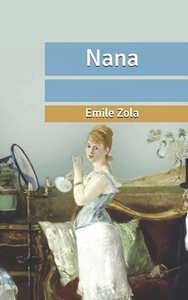You need to sign in or sign up before continuing.
Take a photo of a barcode or cover
challenging
dark
funny
sad
tense
slow-paced
Plot or Character Driven:
A mix
Strong character development:
No
Loveable characters:
No
Diverse cast of characters:
No
Flaws of characters a main focus:
Yes
Personally, novels that center on the intertwined lives of high society always pique my interest, especially when the lives and personalities of the characters are well developed. With this novel, Zola does just that. Nana gives readers a glimpse into a glamorous world that on the surface one might envy but underneath is tainted with greed, lust, and the inability to be satisfied. Over the course of the novel, readers are able to watch as corruption slowly begins to unravel the lives of those within the social circle. Zola was able to develop a drama filled plot line that had unexpected twists and introduced new characters effectively. Albeit, some elements of the story were more slow than others, but overall, it was an enjoyable read.
dark
mysterious
sad
tense
medium-paced
Plot or Character Driven:
Plot
Strong character development:
Complicated
Loveable characters:
Complicated
Diverse cast of characters:
Complicated
Flaws of characters a main focus:
Yes
I get what Zola was doing when he wrote this, and I appreciate the story for its purpose as an allegorical piece of fiction. But did I enjoy it? Nah....
challenging
emotional
funny
slow-paced
Plot or Character Driven:
Character
Strong character development:
Complicated
Loveable characters:
Complicated
Diverse cast of characters:
Complicated
Flaws of characters a main focus:
Yes
The novel starts with the opening night of a new operetta with a new lead in town: Nana. She is a young girl with no great talent in either acting or singing, but instead with a captivating body and allure that captivates the whole audience. Zola's portrait of the Parisian courtesan is thoroughly depressing though. Her story is set in the last years of the Second French Emprire, and more widely, is part of Zola's chronicle of life of the Rougon-Macquart family.
The descriptions of the Théâtre des Variétés and the behind scenes of theatre life are truly fascinating. The description of the crowd with it's various moods and fancies on the the opening night was great to read. (Interestingly, the crowd scenes at the grand horse race were similarly fascinating. You get a real sense of the mood of the action.) Nana is no actress though and so her role as a street-walker turned courtesan takes over. While Nana has a certain sort of naivete about her it doesn't stop the ruin and destruction of those around her, or ultimately of herself. The wild excess of appetites and decadence seems to be mirrored in both society and Nana's life, and in both cases a lot of it seems unintelligible when reading it now.
Translated, but my Project Gutenburg copy didn't say by whom :(
The descriptions of the Théâtre des Variétés and the behind scenes of theatre life are truly fascinating. The description of the crowd with it's various moods and fancies on the the opening night was great to read. (Interestingly, the crowd scenes at the grand horse race were similarly fascinating. You get a real sense of the mood of the action.) Nana is no actress though and so her role as a street-walker turned courtesan takes over. While Nana has a certain sort of naivete about her it doesn't stop the ruin and destruction of those around her, or ultimately of herself. The wild excess of appetites and decadence seems to be mirrored in both society and Nana's life, and in both cases a lot of it seems unintelligible when reading it now.
Translated, but my Project Gutenburg copy didn't say by whom :(
Haluttava, rehevä ja ennen muuta turhamainen Nana saa niin miehet kuin naisetkin lankeamaan viehätysvoimansa edessä. Nana ei suinkaan ole kuvaus suurenmoisesta prostituoidusta, vaan varsin hupaisa kritiikki yhteiskunnan alenemistilalle.
challenging
dark
emotional
reflective
tense
slow-paced
Plot or Character Driven:
A mix
Strong character development:
Yes
Loveable characters:
Complicated
Diverse cast of characters:
N/A
Flaws of characters a main focus:
Yes
"There she stood, by herself, amidst all her treasures, with a whole horde of men grovelling at her feet. Like those dreaded monsters of old whose lairs were littered with bones, she was walking on skulls and surrounded by cataclysms."
This is the first piece of naturalist literature I read and it made me completely fall in love with the style. Nana Coupeau, a streetwalker turned high class prostitute during the end of the Napoleon III’s reign, rises from the lowest dregs of society to a life of luxury through exploitation of her lovers . Monstrously self centered she breaks everything she touches and leaves all who dare to love her in pieces . Despite her vicious opportunism, she’s a character you can’t help but love even in the moments you despise her. Furthermore, she’s a character you can’t help but understand. The naturalist writing evokes every sense and leaves nothing to the imagination. At the end of 450 pages you’ll feel as though you’ve experienced Nana’s world perfectly but from the perspective of standing on a cold Paris street in 1870 looking through a window to watch a high society candlelit party descend into something much more sinister.
This is the first piece of naturalist literature I read and it made me completely fall in love with the style. Nana Coupeau, a streetwalker turned high class prostitute during the end of the Napoleon III’s reign, rises from the lowest dregs of society to a life of luxury through exploitation of her lovers . Monstrously self centered she breaks everything she touches and leaves all who dare to love her in pieces . Despite her vicious opportunism, she’s a character you can’t help but love even in the moments you despise her. Furthermore, she’s a character you can’t help but understand. The naturalist writing evokes every sense and leaves nothing to the imagination. At the end of 450 pages you’ll feel as though you’ve experienced Nana’s world perfectly but from the perspective of standing on a cold Paris street in 1870 looking through a window to watch a high society candlelit party descend into something much more sinister.
dark
emotional
informative
reflective
medium-paced
Есть некоторая ирония у советского издателя - поместить этот роман #Золя в один том с «Мечтой» (я писал о ней ранее) - и соседство Нана, вавилонской блудницы, с возносящейся в день свадьбы Анжеликой внезапно становится очень органичным. Я ведь говорил, что одержимость у них одного рода по модулю, просто по знаку разная?




